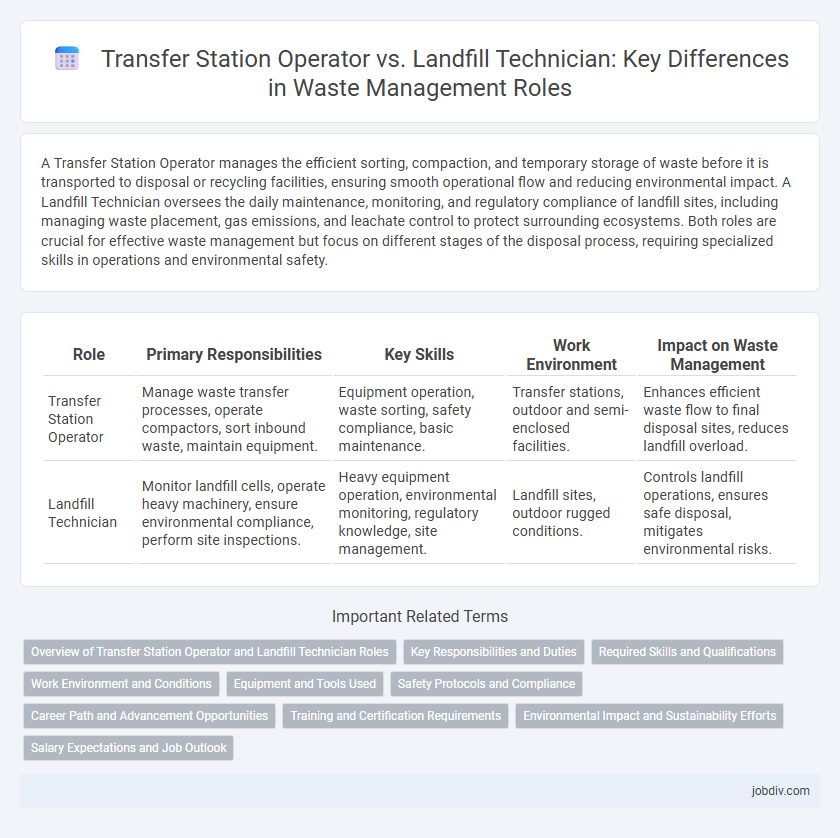A Transfer Station Operator manages the efficient sorting, compaction, and temporary storage of waste before it is transported to disposal or recycling facilities, ensuring smooth operational flow and reducing environmental impact. A Landfill Technician oversees the daily maintenance, monitoring, and regulatory compliance of landfill sites, including managing waste placement, gas emissions, and leachate control to protect surrounding ecosystems. Both roles are crucial for effective waste management but focus on different stages of the disposal process, requiring specialized skills in operations and environmental safety.
Table of Comparison
| Role | Primary Responsibilities | Key Skills | Work Environment | Impact on Waste Management |
|---|---|---|---|---|
| Transfer Station Operator | Manage waste transfer processes, operate compactors, sort inbound waste, maintain equipment. | Equipment operation, waste sorting, safety compliance, basic maintenance. | Transfer stations, outdoor and semi-enclosed facilities. | Enhances efficient waste flow to final disposal sites, reduces landfill overload. |
| Landfill Technician | Monitor landfill cells, operate heavy machinery, ensure environmental compliance, perform site inspections. | Heavy equipment operation, environmental monitoring, regulatory knowledge, site management. | Landfill sites, outdoor rugged conditions. | Controls landfill operations, ensures safe disposal, mitigates environmental risks. |
Overview of Transfer Station Operator and Landfill Technician Roles
Transfer Station Operators manage the intake, sorting, and temporary storage of waste at transfer stations, ensuring efficient processing and proper handling to facilitate transport to disposal or recycling facilities. Landfill Technicians oversee landfill operations, including waste compaction, daily cover application, environmental monitoring, and maintaining compliance with regulatory standards to minimize environmental impact. Both roles are critical in waste management, with Transfer Station Operators focused on waste consolidation and Landfill Technicians dedicated to safe landfill site operation.
Key Responsibilities and Duties
Transfer Station Operators manage the efficient intake, sorting, and temporary storage of waste materials to facilitate seamless transport to disposal or recycling facilities. Landfill Technicians oversee the operations of waste disposal sites, ensuring proper waste compaction, monitoring environmental controls, and maintaining compliance with safety and regulatory standards. Both roles require knowledge of waste handling procedures, but Transfer Station Operators emphasize logistical coordination while Landfill Technicians focus on site maintenance and environmental management.
Required Skills and Qualifications
Transfer Station Operators require skills in heavy equipment operation, waste sorting, and site safety management, with qualifications often including a high school diploma and specific forklift or machinery certifications. Landfill Technicians need expertise in environmental compliance, monitoring landfill gas and leachate systems, and performing routine maintenance, typically holding certifications in hazardous waste management or environmental science. Both roles demand strong problem-solving abilities and knowledge of local waste management regulations to ensure efficient and safe disposal processes.
Work Environment and Conditions
Transfer Station Operators work primarily in controlled facilities where they manage incoming waste materials, often exposed to heavy machinery noise and varying weather conditions due to outdoor operations. Landfill Technicians operate on expansive landfill sites, regularly exposed to extreme weather, dust, odors, and potential safety hazards while monitoring waste disposal and environmental compliance. Both roles require adherence to strict safety protocols but differ significantly in environmental exposure, with Transfer Station Operators typically working indoors and Landfill Technicians outdoors.
Equipment and Tools Used
Transfer Station Operators primarily use heavy machinery such as front-end loaders, compactors, and conveyor belts to sort and manage incoming waste efficiently. Landfill Technicians rely on specialized equipment including bulldozers, compactors, and groundwater monitoring tools to manage landfill operations and ensure environmental compliance. Both roles require proficiency with maintenance tools for equipment upkeep and safety gear to handle hazardous materials.
Safety Protocols and Compliance
Transfer Station Operators and Landfill Technicians both adhere to strict safety protocols and regulatory compliance, with operators focusing on managing incoming waste materials and ensuring proper segregation to prevent hazards. Landfill Technicians emphasize monitoring landfill gas emissions, maintaining leachate control systems, and conducting routine environmental inspections to meet EPA and local regulations. Both roles require rigorous use of personal protective equipment (PPE) and adherence to OSHA standards to minimize workplace accidents and environmental risks.
Career Path and Advancement Opportunities
Transfer Station Operators typically begin their careers managing waste intake and sorting operations, gaining hands-on experience with logistics and equipment handling. Landfill Technicians often advance by specializing in site maintenance, environmental compliance, and waste monitoring, positioning themselves for supervisory or environmental management roles. Career progression from operator to technician usually involves additional certifications in environmental regulations and waste management technologies.
Training and Certification Requirements
Transfer Station Operators typically require certification in waste management principles, safety protocols, and equipment operation, often obtained through state-approved training programs lasting several weeks. Landfill Technicians need specialized certification focusing on environmental regulations, landfill gas monitoring, and leachate management, usually mandated by state environmental agencies. Both roles demand ongoing training to comply with evolving safety standards and regulatory updates in waste handling.
Environmental Impact and Sustainability Efforts
Transfer Station Operators manage waste sorting and temporary storage, optimizing material recovery to reduce landfill contributions and support recycling initiatives. Landfill Technicians oversee landfill operations, implementing gas capture systems and leachate treatment to mitigate environmental contamination and greenhouse gas emissions. Both roles are crucial for sustainable waste management, with Transfer Station Operators emphasizing waste diversion and Landfill Technicians focusing on minimizing the ecological footprint of disposal sites.
Salary Expectations and Job Outlook
Transfer Station Operators typically earn an average salary ranging from $35,000 to $50,000 annually, with job outlook growth driven by urban waste management demands. Landfill Technicians earn slightly higher, averaging between $40,000 and $60,000 per year, reflecting specialized skills in environmental compliance and site monitoring. Employment opportunities for both roles are expected to grow by approximately 5% over the next decade due to increasing regulatory requirements and sustainable waste disposal practices.
Transfer Station Operator vs Landfill Technician Infographic

 jobdiv.com
jobdiv.com